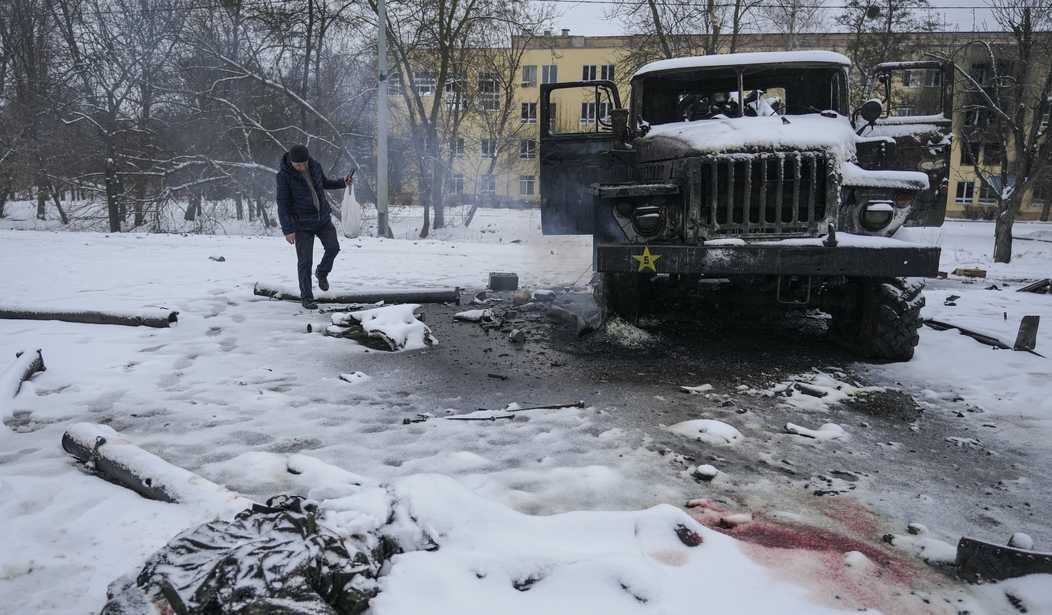I can’t understand how, or why, a pro-Kremlin paper would publish a number like this. As juicy as it is, surely they would have realized how embarrassing it is for their masters and what sort of consequences there might be for revealing it.
I can’t understand either who would have leaked it, as this information must be closely held.
And frankly, given how incompetent the Russians seem and how indifferent they are to loss of life, I’m surprised they’re keeping a count of their own fallen troops to begin with.
But the figure is shocking if true. In less than a month of war, this would easily exceed the number of U.S. KIA in Iraq and Afghanistan, two conflicts that spanned nearly 30 years combined.
Komsomolskaya Pravda, the pro-Kremlin tabloid, says that according to Russian ministry of defense numbers, 9,861 Russian soldiers died in Ukraine and 16,153 were injured. The last official Russian KIA figure, on March 2, was 498. Fascinating that someone posted the leaked number. pic.twitter.com/LHrBWIQ49z
— Yaroslav Trofimov (@yarotrof) March 21, 2022
aaaand it’s gone https://t.co/QCjwuvwWAd pic.twitter.com/smTWGq9KoJ
— Kevin Rothrock (@KevinRothrock) March 21, 2022
The Red Army lost 15,000 men during the Soviet war in Afghanistan. Over 10 years.
As gaudy as the apparently leaked number is, it’s in line with other estimates. Five days ago, sources in U.S. intelligence told the Times they believed 7,000 Russians had been killed — conservatively.
Other estimates circulating are higher:
A former internal affairs minister of #Ukraine @AvakovArsen shared the intercepted Russian military summary for March 18: Rus. Army troops killed 12,814. Private company Liga (former Vagner) troops killed 4,451. Total number ofservicemembers killed at war in Ukraine: 17,265. pic.twitter.com/TuSTIyHW5n
— Victor Kovalenko (@MrKovalenko) March 21, 2022
That’s not wildly out of line with the number published in Komsomolskaya Pravda. Maybe the Ukrainian figures encompass regular Russian forces plus “separatists” fighting in the Donbas while the KP figures are limited to regular forces only.
If it’s true that 10,000 Russians have been killed and another 16,000 wounded, that’s more than 10 percent of the total force out of action in less than a month, with no obvious prospects for mass reinforcements to fill the manpower vacuum.
According to the WSJ, the fingerpointing inside the Kremlin has begun:
The blame game, which includes the detention of at least one senior Russian intelligence official, doesn’t appear to pose any immediate threat to Russian President Vladimir Putin’s iron grip on power, but the U.S. officials are watching the machinations closely.
A U.S. official described as credible reports that the commander of the FSB intelligence agency’s unit responsible for Ukraine had been placed under house arrest.
The official, in an interview, also said bickering had broken out between the FSB and the Russian Ministry of Defense, two of the principal government units responsible for the preparation of the Feb. 24 invasion.
If the FSB spent the weeks before the invasion promising everyone it’d be a cakewalk and the Ministry of Defense is now looking at 10,000 dead then yeah, I imagine some “bickering” would be in order.
Aghast at the horrendous bloodletting on both sides from Putin’s war of conquest, a dejected Daniel Hannan poses a question today at the Examiner: How can any American patriot support Putin?
But what is it that Trump and his followers see in Putin in the first place? This is where I start to worry. For a Reagan conservative, Putin’s flaws are obvious. He does not respect elections. He believes he can make up the rules as he goes along. He defines some of his people as “traitors” and encourages others to go after them. The sole principle of his foreign policy is Machtpolitik — let the stronger take from the weaker. He has replaced multiparty pluralism with a cult of personality. He can’t tolerate criticism.
Are Trumpsters as repelled by these things as Reaganites? Considering that list in an American context, I wonder. Things have changed since the Gipper’s time. In a polarized age, people are readier to overlook the shortcomings of politicians who specialize in “owning” the other side. Instead of wanting to limit the state as a general principle, modern conservatives are happy to make use of it when it suits their ends. And whereas they used to support candidates who shared their principles, they now tend to shift their principles whenever their champion does.
It’s not just nationalist Republicans. Noah Smith notes that Russia has some apologists on the socialist left as well and wonders how that can be. Why do the fringier elements of America’s two parties, which despite each other, nonetheless manage to find common ground in the unlikely figure of Vladimir Putin? His conclusion is astute: “Both the liberal center-Left and the conservative center-Right are basically committed to upholding the global liberal order. Putin, by invading and attempting to conquer a sovereign state, challenges that order. If Putin succeeds, even modestly, it represents a failure for the U.S. establishment figures who tried to stop him. And establishment failures equal insurgent opportunities. Both the rightists and the leftists here are fighting against the Fukuyaman end-of-history idea that gives their own movements little space to move up.”
Both fringes disdain classical liberalism, believing it to be decadent (for different reasons), and are eager to replace it with a form of authoritarianism which they find agreeable. A Russian win would be another black eye for the liberal democratic Euro-American model that’s prevailed since World War II — i.e. “the west” — and might lead more voters here to turn towards the fringes to restore national prestige. As a classical liberal, Hannan naturally finds that prospect and the spectacle of Americans cheering Putin on to victory distressing. But if the leaked numbers of KIA are accurate, I don’t think he should worry much.








Join the conversation as a VIP Member